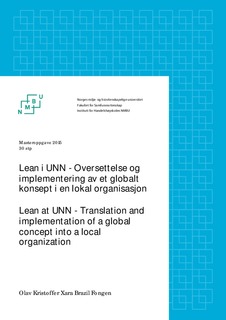| dc.description.abstract | The goal of this master thesis has been to analyze how UNN HF have handled translation and
implementation of the global organizational concept that is Lean, including how and in which
functional areas the concept is practically expressed. This is a relevant theme, as Norwegian
healthcare is facing heavy pressure from politicians and consumers, demanding improvement
in effectiveness and efficiency. The thesis seeks to analyze UNNs decision concerning the
use of a concept that origins from the Japanese automobile industry to improve Norwegian
healthcare. This has led to the following research question:
"In which functional areas have UNN used a Lean-based strategy of operations and how is the
concept implemented?
To cover all aspects of the research question, the following three sub-questions are also
discussed and answered:
1. In which functional areas do UNN use Lean?
2. How have Lean been translated and how is it practically expressed?
3. How do Lean work as a global concept in a local organization?
Based on Røviks (1998:2007) definition of translation theory as a "theory that seeks to
explain what happens with the contents of an organizational concept when it is translated", the
thesis analyzes UNNs process of adopting Lean. As a common definition of what Lean is, the
thesis uses Niklas Modig and Pär Åhlströms (2010) definition of Lean as "an operational
strategy which prioritize flow efficiency prior to resource eficiency."
The thesis is a qualitative document study which has retrieved its data from internally and
externally published documents from UNN. As supplementary data, key employees within
UNNs work with patient careers, have assisted through personal correspondence.
The thesis presents a key selection of UNNs translations of Lean, on both high and low
abstraction levels, as well as key Lean-terms. Initially UNN cooperated with the consultant
agency Implement Agenda AS regarding translation, and this way they strengthened their
competence as a joint translator. The analysis of the translation process shows that UNN have developed a version of Lean
where no parts have been copied directly, and discusses how this local version can be
characterized as a brand new concept.
The thesis concludes by determining that UNN have used Lean in functional areas that
improves patients careers throughout the health enterprise, crossing geographical locations
and technological systems. As a concept, Lean have been implemented as a top-downorientation,
through an adoption process that has led to translations and customizations of all
abstraction levels in the original concept. The translations makes the fact that UNN have
implemented a Leas as a "partial imitation" that has gained governing power over functions in
the organization, without being combined with other concepts. UNN has anchored their
implementation in a patient oriented focus and stakeholder oriented and continuous work of
improvement, driven by their employees. To define UNN as a "Lean-hospital" does not mean
that they have reached a status through achieved results so far. It rather implies that they are
in a state-of-mind where they strive to achieve even better results in the future. | nb_NO |
